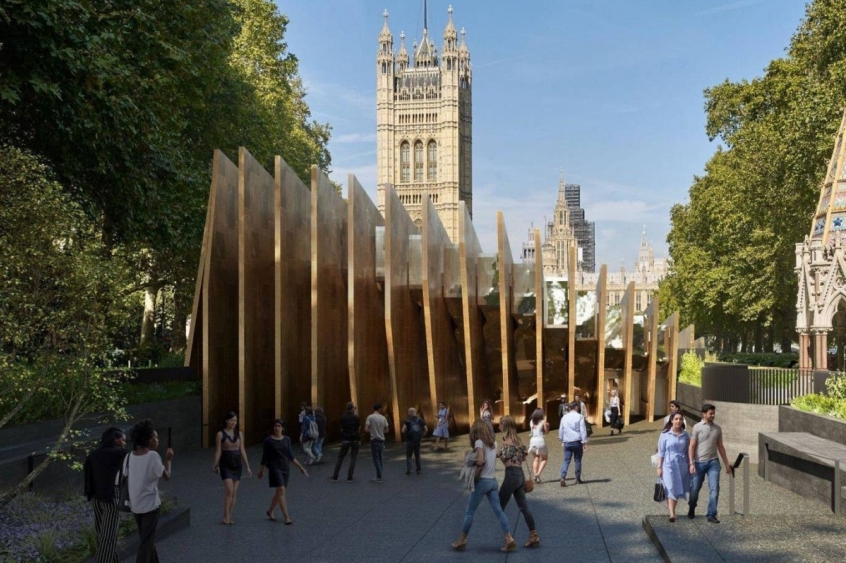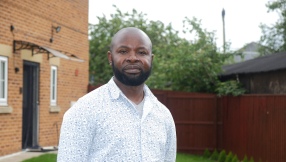
Just like our churches and synagogues, could it not also be argued that parks and public gardens are are also a sacred space?
If you enjoy an occasional outing to your local park, with swings and an area for children's ball games, you may well regard the building of a gigantic 'toast-rack' in a prominent position, possibly damaging the children's play area, a bit of an imposition, to put it mildly.
That is certainly the concern of myself and many others - Jews and non-Jews alike - regarding the proposed Holocaust Memorial and Learning Centre on a spot in Victoria Tower Gardens, a Grade II listed park directly adjacent to the Houses of Parliament.
If this is being done in the name of the 6 million Jews exterminated in the Holocaust, including at least 1.5 million children, I am beginning to think that this country has gone off its head a wee bit. Especially if the Jews end up getting the blame for this ridiculous proposition, which could well happen.
Both the Royal Parks and Historic England have raised concerns that the planned memorial will not do much for the environment or for good relations between different communities, let alone encourage future generations to learn from the death of the 6 million Jews in the Holocaust.
Surely you might ask, if we want children to learn about this dreadful event, known as the Shoah to Jews, it's not a terribly good idea to deprive them of their very own playground or overshadow the already existing monuments.
In case you think that I am not sensitive to the memory of the Holocaust, you couldn't be more wrong. I am the daughter of Holocaust survivors. My own grandmother was among the many so cruelly killed in Treblinka concentration camp, while my uncle miraculously survived Auschwitz.
In addition, as a teacher and educator, I have been engaged in Holocaust education for the last 30 years, and was even recently the recipient of a grant to put on a Holocaust concert here in Greater Manchester in honour of survivors and their families.
In March 2017, I was also one of those invited by the Prime Minister's office to Manchester Town Hall in order to give my own view on the different architectural designs for this misconceived project. You could say that my professional advice was sought by the powers-that-be only to then be discarded. In hindsight, I feel that the whole thing was put forward on the basis of false premises and not on any of the salient facts which have trickled out through the press.
READ MORE: Westminster Holocaust memorial plans challenged over anti-Semitism fears
In the last few weeks, I have sensed a quiet fury among my Jewish friends, colleagues and acquaintances, and especially those who are either survivors of the Holocaust themselves, or the next generation, my own contemporaries. There is frustration that these plans won't only destroy a lovely park and damage relations with the residents of Westminster, but will also damage our own credibility as a Jewish community in this land, numbering only 0.3% - a community who usually prefer to keep a low profile, but which are now being forced into the public domain on the issue.
There are good grounds for our fears. We are now in the frightening situation of having the leader of the opposition Labour Party repeatedly accused of anti-Semitism without providing any statements or actions that have been sufficient to quell the concerns of the Jewish community.
The Labour Party, represented in London by Mayor Sadiq Khan, is being actively investigated for anti-Semitism, so his strong support for the memorial does seem a bit peculiar, to say the least, and even smacks a little of using the Jewish community for his own ends. If the Labour Mayor of London is so keen on combatting anti-Semitism, as he has claimed in a recent letter to the Leader of Westminster Council, then why continue to be the member of a party so widely regarded by the Jewish community as anti-Semitic.
That is the current situation for the Jews in the UK. Despite the Holocaust 'industry' really getting going in the 1980s, anti-Semitism has only increased over the last 30 years, and no memorial can alter this; indeed it may well simply exacerbate the situation.
It could even be argued that this Holocaust memorial is simply displacement activity from the real and present danger of anti-Semitism in all of our major institutions - political, religious, academic and educational, not to mention the media, which simply reflects the views of the many.
From my own conversations and observations, I cannot discern widespread support within the Jewish community for this obtrusive construction. Instead, what I do find is very real concern about burgeoning anti-Semitism and at the same time a fear that our leaders will resort to nothing more than empty gestures that do little to make things better.
What we don't need is tokenism. What we do need is real action in areas like school education policy to address the frightening increase in anti-Semitism against Jewish students on university campuses, as well as the discrimination faced by Jewish school children and teachers.
That is why our critics are wrong to say that those who have concerns about this memorial are anti-Semitic. It is out of our very real concerns about anti-Semitism that we dare to voice these objections.
There is a lot that Jewish teaching can speak into this row over the memorial, starting with what the Hebrew Bible has to say about personal relationships.
The main tenet of Judaism is 'Love your Neighbour as yourself' (Leviticus 19) and the Old Testament prophet Micah (6:8) tells us how to do this: "Act justly, love mercy and walk humbly with your G-d."
This means paying attention to the other and listening. It means taking the time to stand in another person's shoes and think about what it feels like to be them and see things as they do. It means to give them the time of day out of a sense of love and respect for them as a person because they have something valid to say and want to be heard and valued just as much as those on the other side do.
What wise words for big business, politicians, local authorities - and our critics - to reflect on today.
Dr Irene Lancaster is a Jewish academic, author and translator who has established university courses on Jewish history, Jewish studies and the Hebrew Bible. She trained as a teacher in modern Languages and Religious Education.
MORE BY THIS AUTHOR
Gimmicks might catch the attention, but education puts down roots that will last
The problem with relationships education
Fear and free speech: why defining Islamophobia could do more harm than good













